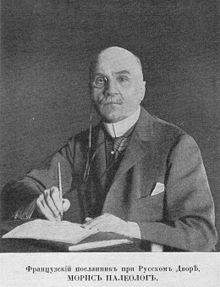- Maurice Paléologue
-
Maurice Paléologue (13 January 1859—18 November 1944) was a French diplomat, historian, and essayist.
Contents
Biography
Paléologue was born in Paris as the son of Alexandru Paleologu, a Wallachian Romanian revolutionary who had fled to France after attempting to assassinate Prince Gheorghe Bibescu during the 1848 Wallachian revolution; Alexandru was one of three illegitimate children of Elisabeta Văcărescu of the Văcărescu family of boyars - he and his siblings were later adopted by Zoe Văcărescu, Elisabeta's mother, who gave the children her maiden name Paleologu.[1] The name became Paléologue in French language spellings; the family's relation to the Palaiologos Byzantines is doubtful (Alexandru's ancestors first claimed it at the end of the 17th century).[2]
After graduating in Law, Maurice Paléologue obtained an office at the French Foreign Ministry in 1880, and moved on to become Embassy Secretary at Tangiers, in the Morocco Protectorate, then in Beijing (Qing China), and later in Italy. A Minister Plenipotentiary in 1901, he represented France in Bulgaria (1907-1912) and Imperial Russia (1914-1917), and moved on to become General Secretary of the Foreign Ministry in the Alexandre Millerand cabinet.
At the same time, Paléologue published essays and novels, and wrote contributions for the Revue des deux mondes. He also wrote several works on the history of Russia in the wake of World War I, which included an intimate portrait of the last Tsaritsa Alexandra Fyodorovna (he had been present at meetings between her and Grigori Rasputin, among others). He was called on to give his testimony during the Dreyfus Affair, and left important notes on the topic.
Paléologue was elected a member of the Académie française in 1928. He died in Paris a few months after the city's liberation during World War II.
Notes
References
- Neagu Djuvara, Între Orient şi Occident. Ţările române la începutul epocii moderne, Humanitas, Bucharest, 1995
External links
- (French) Bio at the Académie française
- (French) Two articles by Maurice Paléologue on Talleyrand and Metternich.
Cultural offices Preceded by
Charles JonnartSeat 19
Académie française
1928-1944Succeeded by
Charles de ChambrunCategories:- 1859 births
- 1944 deaths
- Writers from Paris
- French biographers
- French diplomats
- French essayists
- French historians
- French novelists
- Politicians of the French Third Republic
- Members of the Académie française
- French people of Romanian descent
- Văcărescu family
- Ambassadors of France to Russia
Wikimedia Foundation. 2010.

